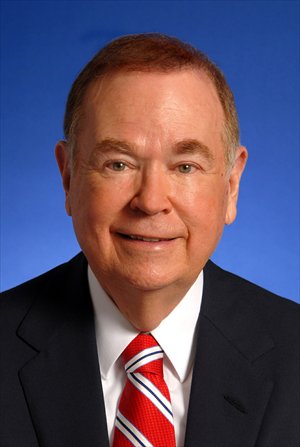Bipartisanship distant dream in US politics

Editor's Note:
Many political commentators in Washington believe that US politics is more polarized than it has been in decades. During a year of fierce competitions for the presidential election, a few people pinned their hopes on the rise of a third party to fix the damage caused by partisan politics. The "Americans Elect" group was formed with this goal, but after raising $35 million in funding, it was unable to find a single eligible candidate. Is there a favorable political climate for the rise of a third party in the US? How would it shape the US political landscape? Global Times (GT) reporter Yang Jingjie talked to David L. Boren (Boren), President of the University of Oklahoma, three-term US Senator and former governor of Oklahoma, on these issues.
GT: Political commentators have repeatedly warned of the political polarization in the US. Do you agree that the political rifts have been ever increasing?
Boren: Yes, that's what worries me. I'm a bipartisan person. I'm a Democrat, but I'm a moderate and centrist.
The center needs to be very strong in the country. If everybody is polarized and everybody is just trying to stay at war with each other in our domestic politics, it causes decisions to get postponed. It causes important economic decisions not to be made. And so are critical foreign policies.
There has to be a lot of cooperation and collaboration across the two parties.
When I was in the US, I was a great believer in that. So I've been very disturbed by the current situation.
GT: Who is to blame for the polarization?
Boren: Both parties are to blame for the polarization. Also I think the influence of money on our politics is to blame, given the fact that we have opened the floodgates almost without limits as to how much money can be donated.
You have people with special agendas that have a lot of money and are able to influence the campaigns. I think that's unhealthy.
GT: As a heavyweight Democrat, you endorsed Barack Obama in the 2008 election, but this year you poured your support behind Americans Elect, a non-partisan group which planned to nominate a bipartisan ticket in the race. Why was the change?
Boren: I thought we needed an electric shock treatment, a shock therapy. The two parties are not working together as they should, so we need a shock.
The idea was something like Americans Elect. They were not a third party. They were an idea of getting a Democrat and a Republican to run together. It was a unity ticket. It's very promising that they got on the ballot nearly in all 50 states. That would be the shock, if they could win. They could bring the two parties back together, cooperating again.
I told Obama that it's not aimed at him or opposing him. For any future president, whether it's Republican candidate Mitt Romney or Obama, if the two parties fight, no president would be able to get anything done.
The problem was it only works when you have two great candidates, a great Republican and a great Democrat who will run together. There were very, very important people in US politics who considered running together, and they backed out. So it fell apart. It's not going to be a major factor after all this year.
But I think too much time and effort were spent getting on the ballot in all 50 states, and not enough time was spent on recruiting the right two people who would run together. They should have started three years ago recruiting the candidates.
I'm still very worried that we could end up whichever candidate wins. After this election, somehow we have to find a way to put the country ahead of the party. We have to put the country first, and that's going to help a lot of things. It is going to help US-China relations. It's going to help on our ability to work together on economic crisis in the world. We cannot get our act together because we are fighting too much.
GT: You mentioned that money is very important in the US campaigns. In this way, could a third party be able to raise enough funds for the campaigns?
Boren: I think they will. Because if you look at Obama, he got it from the Internet, and he got it from small contributions. That's how he started out.
And I think in the long run it's not going to take the right candidates. It's going to take some new laws to limit the amount of money they can collect.
GT: Is there a favorable climate in the US for the rise of a third party?
Boren: I think there is. But I think even more that there is a favorable climate for a unity ticket. If you have a Democrat and a Republican who say we are going to run together, and we are going to form a government of both parties, a coalition, that's what could be popular among the voters. If we had got the right people, it might have won this year.
GT: How would the presidential elections impact Sino-US relations?
Boren: Whether Obama or Romney is elected, a positive relationship with China is now understood to be critically important to both countries. In the past 15 years, US politicians from both parties have come to understand that the relationship between China and the US is the single most important bilateral relationship that will determine our future.
China and the US have an opportunity to usher into the world the longest period of peace and stability in modern history, so we should never allow minor differences of opinions or short-term quarrels get in the way of this really close relationship.
